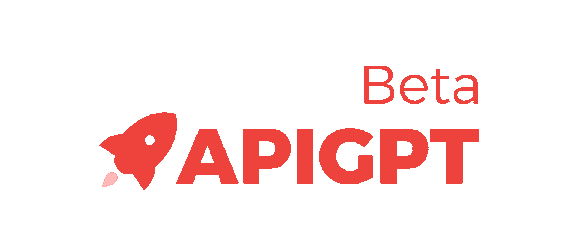APIGPT.Cloud - 应用管理接口
01 认证
所有 账号管理API 请求都应该在 ACCOUNT-KEY HTTP 头中包含你的 账号密钥,如下所示:
ACCOUNT-KEY: <替换成从APIGPT.CLOUD获得的账号密钥>
你可以从以下地方获得账号密钥:
登录 -> 控制面板 -> 设置 -> 企业API -> 账号密钥
02 创建 APIGPT App
API - Create App
POST https://app.pgpt.cloud/api/open/app/
创建一个App
Request body
curl https://app.pgpt.cloud/api/open/app/ \
-H "Content-Type: application/json" \
-H "Authorization: Bearer <API_KEY>" \
-d '{
"name": "TestOpenAI",
"desc": "This is a test App for OpenAI",
"ai_type": "OpenAI"
}'
import requests
headers = {
"Content-Type": "application/json",
"Authorization": "Bearer <API_KEY>"
}
url = "https://app.pgpt.cloud/api/open/app/"
app_data = {
"name": "may app by usage 14",
"desc": "may first app",
"ai_type": "OpenAI",
"plan": 1000, # 选填指端: 1000, 2000, 5000, 10000 不填字段为不限额,
"plan_type": "BY_USAGE"
}
res = requests.post(url, json=app_data, headers=headers)
print(res.json())
参数 - name string Required
App的名字
参数 - desc string Required
App的描述
参数 - ai_type string Required
App的类型,可选类型有["OpenAI", "Claude"]
03 获得 APIGPT App 列表
GET https://app.pgpt.cloud/api/open/app/
请求示范
curl https://app.pgpt.cloud/api/open/app/ \
-H "Content-Type: application/json" \
-H "Authorization: Bearer <API_KEY>"
import requests
headers = {
"Content-Type": "application/json",
"Authorization": "Bearer <API_KEY>"
}
url = "https://app.pgpt.cloud/api/open/app/"
res = requests.get(url, headers=headers)
print(res)
返回示例
{
"errno": 0,
"data": [
{
"id": 181,
"name": "rl的AI助手",
"desc": null,
"ai_type": "OpenAI",
"key": "AG-OTgzZDYTc4YThhOGQTI2NTM5MzgxY2RhNzUxMTc=",
"is_enabled": true,
"created_at": "2023-12-21T02:24:35.070520Z",
"plan": -1,
"current_month_usage": "1.26"
}
],
"msg": "success"
}
Request Params
参数 - page int Optional Default to 1
指定的页码数
参数 - page_size int Optional Default to 20
每页显示数据条数
参数 - name string Optional
要查找的APP应用名称
Response body
参数 - errno int
错误码,0为成功
参数 - data array
包含APP列表
data内各objects参数如下:
| 参数 | 类型 | 描述 |
|---|---|---|
| id | int |
app id |
| name | string |
app 名称 |
| desc | string |
app 描述 |
| ai_type | string |
app 供应商类型 |
| key | string |
app key |
| is_enabled | bool |
app 是否启用 |
| created_at | string |
app 创建时间 |
| current_month_usage | float |
已花费的点数 |
参数 - msg string
错误信息
04 获得 APIGPT App 详情
GET https://app.pgpt.cloud/api/open/app/<App ID>/
请求示范
curl https://app.pgpt.cloud/api/open/app/ \
-H "Content-Type: application/json" \
-H "Authorization: Bearer <API_KEY>" \
import requests
headers = {
"Content-Type": "application/json",
"Authorization": "Bearer <API_KEY>"
}
url = "https://app.pgpt.cloud/api/open/app/225/"
res = requests.get(url, headers=headers)
print(res.json())
返回示范
{
"errno": 0,
"data": {
"id": 225,
"name": "may app by usage 14",
"desc": "may first app",
"ai_type": "OpenAI",
"key": "AG-NmFlOTdkMDBhNzhhNDY0ZDRjYmU5M2E4NWZhZjQ=",
"is_enabled": true,
"created_at": "2024-02-06T02:05:43.454699Z",
"plan": null,
"plan_type": "BY_USAGE",
"balance": 0.0,
"current_month_usage": "0.00",
"total_usage": "0.00"
},
"msg": "success"
}
05 更新 APIGPT App
PATCH https://app.pgpt.cloud/api/open/app/<App ID>/
请求示范
curl https://app.pgpt.cloud/api/open/app/<App ID>/ \
-H "Content-Type: application/json" \
-H "Authorization: Bearer <API_KEY>" \
-d '{
"name": "TestOpenAI",
"desc": "This is a test App for OpenAI",
"is_enabled": false,
"plan": 1000
}'
import requests
headers = {
"Content-Type": "application/json",
"Authorization": "Bearer <API_KEY>"
}
url = "https://app.pgpt.cloud/api/open/app/225/"
update_data = {
"name": "TestOpenAI",
"desc": "This is a test App for OpenAI",
"is_enabled": False,
"plan": 1000
}
res = requests.patch(url, json=update_data, headers=headers)
print(res.json())
Request body
参数 - name string Optional
app 名称
参数 - desc string Optional
app 描述
参数 - is_enabled string Optional
是否启用app,true-启用, false-禁用
参数 - plan int Optional
使用限额,仅支持 1000, 2000, 5000, 10000
错误代码
| Error Code | Meaning |
|---|---|
| 400 | Invalid request: there was an issue with the format or content of your request. |
| 401 | Unauthorized: there's an issue with your API key. |
| 403 | Forbidden: your API key does not have permission to use the specified resource. |
| 404 | Not found: the requested resource was not found. |
| 429 | Your account has hit a rate limit. |
| 500 | An unexpected error has occurred internal to Anthropic's systems. |
| 529 | Your API is temporarily overloaded. |
When receiving a streaming response via SSE, it's possible that an error can occur after returning a 200 response, in which case error handling wouldn't follow these standard mechanisms.

